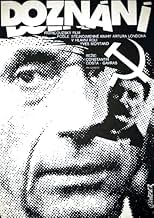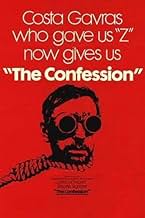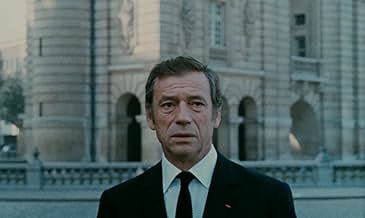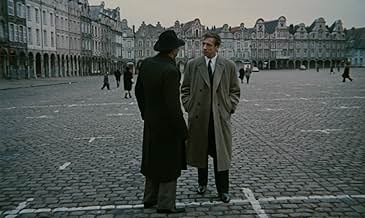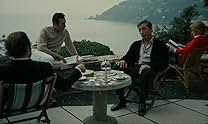IMDb RATING
7.8/10
5.2K
YOUR RATING
A high-ranking official is forced to confess to high treason.A high-ranking official is forced to confess to high treason.A high-ranking official is forced to confess to high treason.
- Nominated for 1 BAFTA Award
- 3 wins & 3 nominations total
Featured reviews
I saw this film last night and it has being going around in my head all day. It builds with a slow intensity which becomes absolutely compulsive. In style it reminded me a lot of The Godfather films. Calm, matter of fact but intensively observed portrayals of almost unbelievably hideous events. It has the same effect - if you stop to watch for just a few seconds, you are irresistibly drawn into the stream of events. Yves Montand is at his down beat best. What struck me most is that this true story of the post-way purges in the USSR's East European client states is of a time and place almost inconceivable to most of us now. The blind belief in The Party, the Inquisition-like mind games of the interrogators that convince the accused that to demonstrate their true loyalty to the Party, they must confess to the most ridiculous accusations of their betrayal of it. And I was surprised to see that it was made in 1971, the feel is absolutely contemporary, even though it depicts such far off events. While I was watching, I was convinced that I knew the story - isn't this the same as Koestler's 'Darkness at Noon'?
Came across this excellent film tonight on the Turner Classic Movie channel. I won't rehash the film story here, it has been explained quite well by previous reviewers.
Want only to state that I first saw it when it was released back in 1970-71. I was a very young soldier then. The Vietnam war was still raging and the cold war with the Soviets and Warsaw Pact nations was very real. The Soviet invasion of Czechoslovakia in 1968 was still fresh in our minds.
Even though it is not entirely an anti-communist film, rather an honest look of what can and did go horribly wrong in soviet bloc countries, it was a chilling reminder to us of how frightening life could be in a totalitarian state.
Released here in the U.S. during a time of continued civil unrest and anti-war sentiment carried over from the late '60's, it was sort of a reality check to the growing affection for the left wing, socialist philosophy etc. among the younger generation.
Want only to state that I first saw it when it was released back in 1970-71. I was a very young soldier then. The Vietnam war was still raging and the cold war with the Soviets and Warsaw Pact nations was very real. The Soviet invasion of Czechoslovakia in 1968 was still fresh in our minds.
Even though it is not entirely an anti-communist film, rather an honest look of what can and did go horribly wrong in soviet bloc countries, it was a chilling reminder to us of how frightening life could be in a totalitarian state.
Released here in the U.S. during a time of continued civil unrest and anti-war sentiment carried over from the late '60's, it was sort of a reality check to the growing affection for the left wing, socialist philosophy etc. among the younger generation.
I got dragged into this movie like the protagonist got dragged into the brutal, endless interrogation. Given the overall vapidity of most of today's films, this is a real diversion into the power that really lies beneath the surface of movies, the acting, the writing, directing, and most important the mood. The mood of this film drags you like it does the character played by Yves Montand, as he endures a two year interrogation by the people's republic. It's real historic as well, full of details about Titoists, Trotskyites, and anarchists and paranoia over the struggle to control the communist revolution. But Montand looks great as he endures an impressive variety of interrogation techniques.
Anton Ludvik, aka Gerard, is vice-minister of Foreign Affairs of Czechoslovakia. He realizes he is watched and followed. One day, he is arrested and put into jail, in solitary confinement. Will be shown the mental tortures during the investigations and how a faithful top-ranking civil servant is made to confess to treason.
A French political thriller based on a real story in Czechoslovakia? Wow! This actually makes a lot of sense. The Czech people do not have many stories told about them, but they do happen to live in an unfortunate area, sandwiched between Germany and Russia. And, as we know, throughout the 20th Century, those two nations liked to assert their influence on the neighbors.
It is so great to see the story here of a man who stood against the Nazis now having to fight back against the politicians he helped support (sort of).
A French political thriller based on a real story in Czechoslovakia? Wow! This actually makes a lot of sense. The Czech people do not have many stories told about them, but they do happen to live in an unfortunate area, sandwiched between Germany and Russia. And, as we know, throughout the 20th Century, those two nations liked to assert their influence on the neighbors.
It is so great to see the story here of a man who stood against the Nazis now having to fight back against the politicians he helped support (sort of).
The split between Tito and Stalin (1948), in the late 1940s and early 1950s, was followed by show trials of prominent Communists all over Eastern Europe and the wave of Stalinist purges in which tens of thousands suffered or lost their lives. This movie is about the 1952 process in Prague, conducted against Rudolf Slánský and 13 other leading members of the Communist Party of Czechoslovakia (KSC). The main protagonist - Anton Ludvik, aka Gerard, is based on Arthur London, veteran of the Spanish Civil War and the French resistance movement, who, at the time of the arrest, was vice-minister of Foreign Affairs of Czechoslovakia and a senior official of KSC. Display of Stalinist torture and interrogation process in preparation for rigged political trial is very realistic. Based on actual events.
Did you know
- TriviaThe film was restored in 2014 by KG Productions with the support of the CNC under the supervision of Costa-Gavras by Éclair Group for the image and L.E. Diapason for the sound.
- ConnectionsEdited into The Last Bolshevik (1993)
- SoundtracksL'Aveu (Générique)
Written by Giovanni Fusco
- How long is The Confession?Powered by Alexa
Details
- Release date
- Countries of origin
- Languages
- Also known as
- Das Geständnis
- Filming locations
- Grand Place, Arras, Pas-de-Calais, France(London seeing Kahoutek for the last time)
- Production companies
- See more company credits at IMDbPro
Box office
- Gross US & Canada
- $329,954
Contribute to this page
Suggest an edit or add missing content

